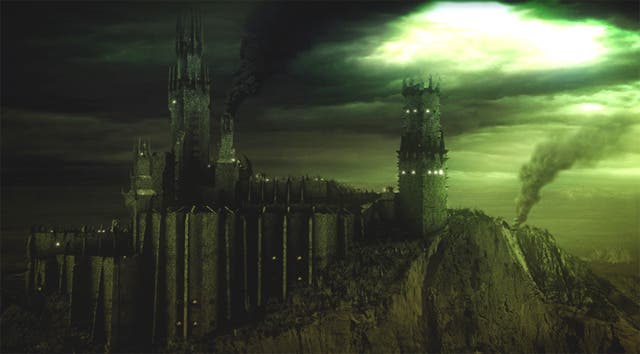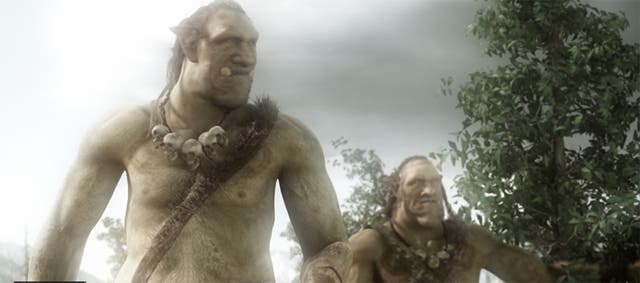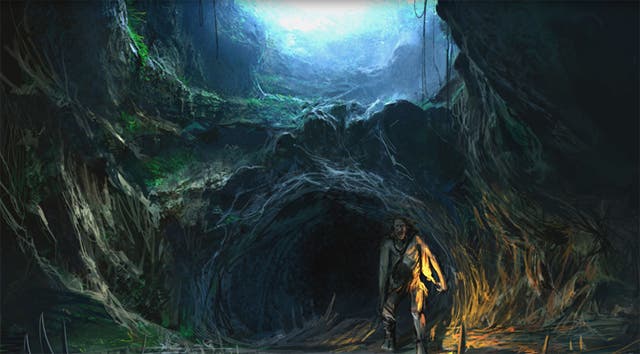Lord of the Rings: The White Council
One RPG to rule them all?
Electronic Arts' Redwood Shores campus has a lot in common with Middle-Earth. All right, not a lot, but it feels just as expansive, and it's populated by at least as many men with beards.
We're here for EA's annual Studio Showcase, where they present their latest line-up. This year, that includes Lord of the Rings: The White Council - previously known only under the working title of Project Gray.
During a presentation earlier in the day, the game's real name was revealed by executive producer Steve Gray, alongside a trailer showing all manner of exciting scenes. A hobbit battling a giant wolf, murderous looking giants stomping through a forest, an enormous dragon slumbering atop a huge pile of gold... And, of course, an ominous voiceover by Sir Ian, or at least someone who sounds a lot like him.
Now we've tracked down Gray to find out more about the game - or at least, the bits he's allowed to tell us about. Which doesn't include multiplayer modes or online options, unfortunately. Or which platforms it'll definitely appear on - "Target platforms are PlayStation 3 and Xbox 360," apparently. "We're also talking about doing a PC version, but we can't commit to it yet," says Gray.
Still. He can at least reveal a few details of the storyline, which takes place around 80 years before the events of the LOTR series. Bilbo has yet to find his precious ring, Aragorn has yet to make the transition from boy to man, and Saruman has yet to go all mental, but that doesn't mean all is well in Middle-Earth.
"If you look up your Tolkien history, the main centre of evil at this time was the Dol Guldur, and that becomes the ultimate point of conflict between the White Council and the forces of evil," Gray explains. The White Council, you see, was set up specially to deal with said forces. It's a group of elves and wizards which includes the likes of Gandalf, Elrond, Galadriel, Radagast and Saruman, all of whom appear in the game.
Hobbit forming

So where do you come in? Well, "The fundamental idea is that you build up your character and become of sufficient stature that you eventually become an agent of the White Council. They ask you to go out and do things for them, and eventually you become so powerful that they ask you to confront the ultimate evil of that time," says Gray.
In other words, you'll spend most of your time completing quests - but whether you follow the game's storyline to the letter or go off and do your own thing is up to you.
"We started off with the idea that we wanted to create what in a sense you might call a sandbox Middle-Earth, which is a version of Middle-Earth in which you will find characters, as Tolkien describes them, going about their business, doing the things they should be doing, having the interactions that they should be having and so on," Gray says.
"You would come into that environment and have the opportunity to make up your own story; to say, 'I'm the hero of Middle-Earth, and I want to go and do this, and I think this is important and this is how I'm going to spend my time.'"
But once the project was a bit further down the line, according to Gray, the team decided that a free-roaming Middle-Earth just wouldn't be enough to entertain everyone. "We felt that was great, and we still absolutely have that as a goal, but there are many people who, if we just dropped them off in Middle-Earth and said, 'Go have a good time,' they would feel lost, and they would feel gipped that we hadn't taken the time to at least offer them a storyline," he says.
"So what we've tried to do is make a very strong story that you can follow by performing quests, and branches off that which are built around specialising in certain professions - being a fighter or a mage, for example.
Striking a balance

"In a sense, we're trying to push you out into the world and say, 'Instead of only looking at the things we've made up for you, why don't you go and make up some stuff for yourself?' And that's going to be an interesting balancing act over the next year and a half - how hard we pull you along that central thread, and how much we encourage you to spread your wings and find your own way through the world."
The idea, it seems, is to make the game appeal to as many LOTR fans as possible - which means the gameplay features a combination of elements, too. White Council is being worked on by the same teams that produced button mashers The Two Towers and Return of the King, plus turn-based RPG titles The Third Age and LOTR: Tactics; and all of their combined experience is set to come in handy here.
"Going into this, we wanted to take the best elements of the Two Towers and Return of the King, and make that the front end of the combat system, and then take the best elements of our RPG system and make that the back end," explains Gray.
"We're trying to give it both something that will appeal to the action fans as well as enough depth and complexity to appeal to RPG fans."
But what about the broader category of Lord of the Rings fans? How happy are they going to be that some of the content in White Council has been invented specially for the game, and doesn't appear in Tolkien's original work?
"We've spent four years now building Tolkien products, so we felt like we were ready to actually try and make something that is new - but, of course, very, very derivative of Tolkien's work. Because not only are we all fans, but we also know that all the fans of his work out there are not going to be very happy if we go write some crazy story that doesn't make any sense," says Gray.
"So, yes, the actual story is new, but the world, the characters in it, the way they behave, the elements of the story, are very much taken from Tolkien's work."
New faces

There are some new characters, Gray explains, "But they're not Middle-Earth-changing, huge characters - there's not an extra wizard, for example, because that would be too much, I think."
Similarly, "There are new locations, but not new major locations. So places like Brie are in there, Rivendell, Gray Havens... There might be some extra towns along the way, and Tolkien never talked about them. But it makes sense that they would be there."
Still, it's a bit of a risk to start inventing things for the universe Tolkien created... Isn't Gray worried that fans will react negatively? "Yes," he admits.
"The only thing that makes me hopeful is that I don't know if there's a more hardcore set of Tolkien fans anywhere."
Well, surely there's one down Peter Jackson's way? "That might very well be true! But we are our worst critics about anything that might step outside of what Tolkien himself might have imagined."
Of course, Tolkien might never have imagined that people would one day spend hours on end exploring a virtual Middle-Earth and meeting computer-generated versions of the characters he invented. Or that he'd make a beardy man from New Zealand a millionaire. And we'll never know what he would have made of Lord of the Rings: The White Council - but we'll be sure to let you know our opinion once we've had the chance to give it a go...

